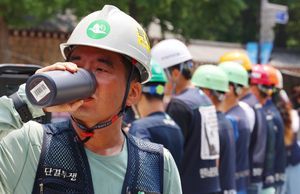![Foreign visitors cool off in sweltering weather in the southeastern port city of Busan on Tuesday, as most parts of the country remain under extreme heat warnings or advisories. (Yonhap)]](https://contents-cdn.viewus.co.kr/image/2025/07/CP-2023-0309/30480377.jpg) Temperatures in the western South Korean cities of Gwangmyeong and Paju soared above 40°C (104°F) on Tuesday, marking the highest July temperatures ever recorded in the country, according to the state weather agency.
Temperatures in the western South Korean cities of Gwangmyeong and Paju soared above 40°C (104°F) on Tuesday, marking the highest July temperatures ever recorded in the country, according to the state weather agency.
This marks the first time temperatures in South Korea have exceeded 40°C (104°F) since August 4 of last year, when Yeoju recorded a temperature of 40°C (104°F) during what was noted as the hottest year in the country’s history.
South Korea has only experienced a handful of instances where temperatures surpassed 40°C (104°F). Daegu recorded 40°C (104°F) on August 1, 1942. After a long gap, several regions, including Hongseong, Chuncheon (north), Uiseong, Yangpyeong, and Chungju, saw temperatures rise above 40°C (104°F) on August 1, 2018. Uiseong again crossed this threshold on August 14 that year. On August 5, 2019, Anseong in Gyeonggi Province also reached 40.2°C (104.4°F).
The KMA reports that the highest temperature ever recorded in South Korea since modern record-keeping began in 1904 was 41°C (105.8°F) in Hongcheon on August 1, 2018.
On Tuesday, Seoul also set a new record. The capital registered its highest temperature for early July in 117 years of record-keeping, with the mercury climbing to 37.7°C (99.9°F) around 3 p.m.
This surpasses the previous record for the first 10 days of July in the capital, which was 36.8°C (98.2°F), set on July 9, 1939.
Seoul wasn’t alone in breaking records. Many other cities nationwide set new high temperature records for early July, including Incheon (35.6°C or 95.1°F), Wonju in Gangwon Province (35.4°C or 95.7°F), Suwon in Gyeonggi Province (35.7°C or 95.3°F), Cheongju in North Chungcheong Province (35.7°C or 95.3°F), Daejeon (36.3°C or 97.3°F), Gochang in North Jeolla Province (35.8°C or 96.4°F), and Busan (34.5°C or 94.1°F), according to the weather agency.
While there may be a slight reprieve from the sweltering weather around Friday, the agency warns that the heat will return due to an influx of hot, humid air from the south.
The heat wave is expected to persist until around July 16, when some rainfall is forecast for the capital area and western Gangwon Province.
Seoul has now experienced its ninth consecutive tropical night between Monday and Tuesday.
The weather agency reports that the nation’s average temperature for the first week of July, excluding southern Jeju Island, was 28.1°C (82.6°F). This is the highest figure recorded since relevant record-keeping began in 1973.










Most Commented